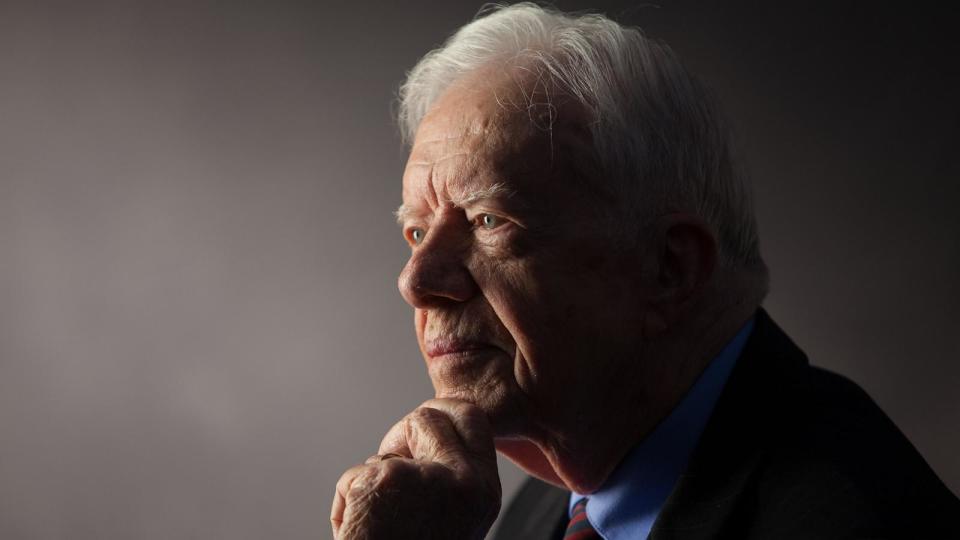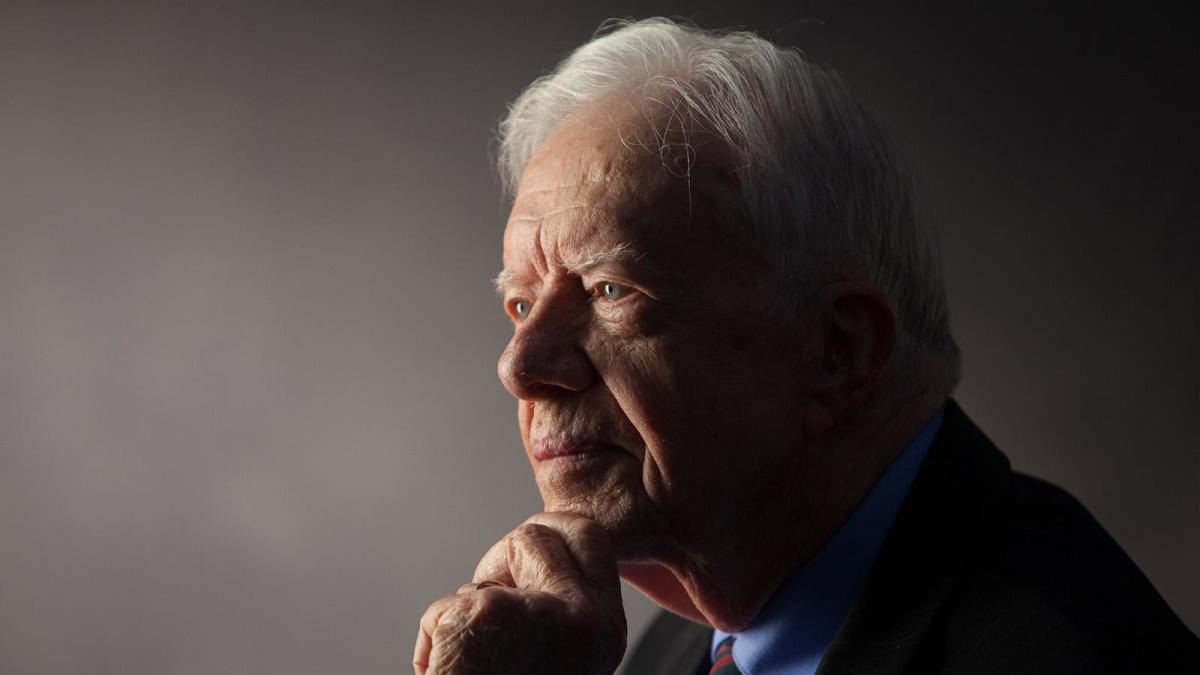Jimmy Carter is celebrating his 100th birthday on Tuesday, marking another milestone for the former U.S. president and Nobel Peace Prize-winning humanitarian.
Carter, who served as the 39th president from 1977 to 1981, is the longest-lived former chief executive in U.S. history.
Carter has been in hospice care since February 2023 after years of health challenges, including a cancer diagnosis. His wife of 77 years, Rosalynn Carter, died in November 2023. Her funeral in their hometown of Plains, Georgia, was the former president’s last public appearance.

Jason Carter, Jimmy Carter’s grandson and chair of the Board of Trustees at the Carter Center, recently told ABC News that his grandfather is “very physically diminished, as you might expect, but he is still smiling, he is still engaging and … paying attention to things around the world.”
Members of the Carter family and prominent musical artists including former Allman Brothers Band member Chuck Leavell, gospel star BeBe Winans and rock band Drive-By Truckers participated in a benefit concert in Atlanta in honor of Jimmy Carter last month. The concert was in support of the Carter Center, the non-governmental organization dedicated to the advancement of human rights founded over 40 years ago by Jimmy and Rosalynn Carter.
MORE: Former President Jimmy Carter to turn 100: What to know about his kids, grandkids
Plains, Georgia, will also host a day of events on Oct. 1, including a naturalization ceremony for new citizens, a military flyover, and an evening concert.
Here’s what to know about Jimmy Carter’s life and legacy.
From peanut farmer to president
James Earl Carter Jr. was born in Plains, Georgia, on Oct. 1, 1924, to James Earl Carter Sr., a peanut farmer and businessman, and Lillian Gordy Carter, a registered nurse. Though he was the first American president born in a hospital, Carter was raised in a farmhouse without indoor plumbing or electricity.
Carter graduated from the Naval Academy in Annapolis, Maryland, in 1946 and after spending seven years as an officer – he volunteered for submarine duty and was honorably discharged in 1953 – he returned to farming. He began his political career in 1962 when he was elected to the first of two terms as a state senator in Georgia. During his tenure, he promised to read every bill that came up for a vote, even taking a speed-reading class to keep up.
Carter later ran for governor of Georgia and won the office in 1970. He announced his bid for the presidency in December 1974 as his gubernatorial term was ending. A relative unknown nationally, Carter used his novelty to appeal to a nation weary of Vietnam and Watergate. After winning the Democratic nomination following early victories in the Iowa caucuses and the New Hampshire primary, he defeated incumbent President Gerald Ford by 56 electoral votes in November, 1977 to win the White House.
Notable achievements
Carter was recognized for bringing a common touch to the presidency. He discontinued limousine service for presidential staff and, as the country weathered an energy crisis, Carter ordered his staff to turn the White House thermostats down in the winter and up in the summer, an energy-conscious practice he continued throughout his public service career.
MORE: Former President Jimmy Carter released from hospital 2 weeks after undergoing brain surgery
Among his administration’s most notable achievements were the Camp David Accords, which Carter brokered between Israeli Prime Minister Menachem Begin and Egyptian President Anwar Sadat in 1978, and which led to the Egypt-Israel Peace Treaty. Carter also established the Department of Education and the Department of Energy, the latter in response to the continued energy crisis.
Yet Carter’s administration struggled with domestic woes, including double-digit inflation, high unemployment, and a gasoline shortage halfway into his presidency caused by a doubling of crude oil prices and a decrease in refinery output, all of which battered his approval rating.
The Iran hostage crisis, in which 52 Americans were held hostage in Iran for a total 444 days, and during which time Carter authorized a disastrous failed rescue attempt in the midst of his re-election campaign, further eroded his popularity. Republican challenger Ronald Reagan defeated Carter in a landslide victory, winning 489 electoral votes to Carter’s 49.
A celebrated post-presidency
Despite being a one-term president, Carter’s legacy became even more distinguished after leaving office.
In 1982, just two years after leaving office, Jimmy and Rosalynn founded the Carter Center, in partnership with Emory University, with the stated mission of promoting global human rights and “the alleviation of human suffering.”
The Carter Center’s many accomplishments include leading the coalition that reduced the incidence of Guinea worm disease in Africa by 99.99 percent. The Center also furthered avenues to peace in Ethiopia, Sudan, Uganda and other conflict zones around the world.
The Carters were also recognized for their decades of work on behalf of Habitat for Humanity, with the couple advocating, fundraising and volunteering on-site for projects with the organization for nearly 40 years.
In 2002, thirty years after losing his presidential re-election bid, Carter received the Nobel Peace Prize, making him then the third U.S. president so honored, following Theodore Roosevelt and Woodrow Wilson. The Nobel Committee cited Carter’s “decades of untiring effort to find peaceful solutions to international conflicts, to advance democracy and human rights, and to promote economic and social development.”
Carter’s advocacy for the causes in which he and Rosalynn believed seemed indefatigable, even in the wake of significant health issues late in his life. He was diagnosed with brain cancer in 2015, from which he later said he had recovered following treatment. Four years later, he sustained what was then described as a “minor pelvic fracture” caused by a fall, and then underwent a surgical procedure the following month to relieve pressure on his brain due to a subdural hematoma.
Asked about Jimmy Carter’s legacy, Jason Carter said in August, 2024, that his grandfather has “a legacy of doing the right thing, of honesty, integrity, of searching out and believing you can build human connections, again, across the world, in some of the smallest villages in Mali or wherever in Africa. I think just the power of human connection and the ability to do what’s right if you just keep being honest and staying true to what you believe.”
ABC News contributor Mark Updegrove contributed to this report.
Former President Jimmy Carter turns 100: A look back at his legacy originally appeared on abcnews.go.com


